Re-Noted: Jim Morrison's Poetry Notes
"I kept a lot of notebooks through high school and college, and then when I left school, for some dumb reason—maybe it was wise—I threw them all away..."
Jim Morrison (1943-1971) wanted to be a poet; instead, he became a rock star.
Throughout his short life, Jim rarely went anywhere without a notebook. As a teenager, every time he learned a new word, he’d write it down and create a story around it. According to his sister, Jim had a remarkable vocabulary.1 He found school boring and decided real education was to be found in the library. When he graduated from high school, he asked his parents for the collected edition of Nietzsche’s works. Doors co-founder, Ray Mazarek, claimed that “Friedrich Nietzsche Killed Jim Morrison.”2 The philosopher taught Jim that whatever doesn’t kill you makes you stronger. To be fair, Nietzsche wasn’t talking about heroin.
In his teenage years, Morrison filled notebooks with quotes from his favorite writers. One summer night in his early twenties, Jim went to the roof of his building and burned the old notebooks. Later, he mourned the loss:
I kept a lot of notebooks through high school and college, and then when I left school, for some dumb reason—maybe it was wise—I threw them all away. There’s nothing I can think of that I’d rather have in my possession right now than those two or three lost notebooks. I was thinking of being hypnotized or taking sodium pentothal to try to remember; because I wrote in those books night after night.
But, then, Morrison wonders if destroying these notebooks allowed him to be more original.
But, maybe, if I’d never thrown them away, I’d never have written anything original—because they were mainly accumulations of things that I’d read or heard, like quotes from books. I think if I’d never gotten rid of them I’d never have been free.3
Morrison filled those early notebooks with other people’s ideas and quotes. His later notebooks would contain his own poetry.
Jim left behind over two dozen notebooks, even though he died at 27 and destroyed his high-school notes. He gave them titles like “Tape Noon,” “GOLD,” “Paris Journal,” and “Lizard Celebration.”
Jim rarely dated his entries and never seemed to care about organizing his notes. Most notebooks cover a span of several years because Jim would grab whatever notebook was on hand. Overall, Jim's notes radiate a “compulsive creativity”4 as he recorded his (often drunk) poetic thoughts onto lined pages.
“Notes on Vision”: The Film Student
In his early 20s, Jim was an artist searching for a medium. He enrolled in UCLA to study film, which is where he formed a band with fellow student, Ray Mazarek. Morrison filled his notebooks from this time with aphorisms on film that he would later publish in The Lords and the New Creatures (1970).
Here are a few of Morrison’s dark views on cinema from these pages. They are rather ungenerous for a person studying film:
Cinema is the most totalitarian of the arts…
Film spectators are quiet vampires
It gives the impression of living
People who are somehow implicated in the process of living have no real need for film. Cinema caters
mostlymainly to a dreary, ignoble psychology, one that accepts copies in place of the real. It is an attitude of dull cowardice…
Jim loved film, but he thought it should challenge the viewer. The film he made, HWY: An American Pastoral (1969) didn’t have much commercial appeal. As he explained in an interview, it’s “poetic…there’s no story or anything.”
The Miami Trial Notebooks
Over the next few years, Jim’s alcoholism accelerated. And his actions became increasingly unpredictable. At a Miami concert in 1969, the police charged Morrison with indecent exposure. He was sentenced to two months in jail. Released on bail, Morrison never served time because he died two years later while the case was under appeal. During the trial, Jim wrote journalistic entries, describing the court along side his usual stream-of-consciousness entries.
What is this insane starting & winking by prosecutors.
The Brunette as bait; distraction
—
great figures of our history & religion had long hair & beards
—
We’re all acting for each other
Tape Noon (1971)
Jim became increasingly frustrated with his rock-star image. So he grew a beard and moved to Paris to establish himself as a poet. Unfortunately, alcoholism followed him.
He walked the streets of Paris with his notebooks. According to his biographer, Stephen Davis,
Jim Morrison carried a white plastic shopping bag from the Samaritaine department store with him whenever he went out. There were usually one or two spiral notebooks…5
One of these notebooks was "Tape Noon," which brought together poems Jim had written over the years. The verses are quintessentially Jim: philosophical, haunted by death, surreal.
To admit fear createsa vacuum which must be filled by action
The grand highwayiscrowdedw/lovers&searchers&leaverssoeagertopleaseandforget.Wilderness
And finally, a line that feels like a send off:
Last words, last wordsout
The Paris Journal (1971)
This was the last of Morrison’s notebooks.
The Paris Journal contains angry, fever-dream poetry.
Now I’m a lonely man
Let me back into
The Garden
Blue shadows
of the canyon
I met you
& now you’re gone
& now my dream is gone
Let me back into your garden…
Jim always saw himself as a poet. He would have loved that he was buried in the Poet’s corner of the Père Lachaise Cemetery in Paris.
Notes on Jim Morrison’s Notes
Messy notes are great: I appreciate how Jim wasn’t precious about his notes. They weren’t beautiful or organized, but that didn’t matter. For Morrison, notes were a way to interrogate his own mind.
Open all the doors: Jim used his notebooks to explore language as a way to explore thought:
…real poetry doesn’t say anything, it just ticks off the possibilities. Opens all doors. You can walk through any one that suits you … and that’s why poetry appeals to me so much — because it’s so eternal.6
Noted is fueled by you. Your ❤️’s and comments inspire me. As always, I would love to know your thoughts.
Till Next Week,
P.S. Paid subscribers look out for a deep-dive into Morrison’s engagement with 1960s culture later this week.
P.P.S This the last day to get 20% off a subscription to Noted.
The discount applies to gift subscriptions as well!
Collecting the Words of Jim Morrison. CBS Sunday Morning, 11 Aug. 2021. YouTube.
Morrison, Jim. Wilderness: The Lost Writings of Jim Morrison. Knopf Doubleday, 1989, p.2.
Hopkins, “Jim Morrison: The Rolling Stone Interview.”
Robbins, Tom. “Forward: Fireflies of the Apocalypse.” The Collected Works of Jim Morrison: Poetry, Journals, Transcripts, and Lyrics, by Tom Robbins, HarperCollins, 2021.
Davis, Stephen. Jim Morrison: Life, Death, Legend. Penguin, 2005, p.428.
Morrison, Jim. Wilderness: The Lost Writings of Jim Morrison. Knopf Doubleday, 1989, p.2.


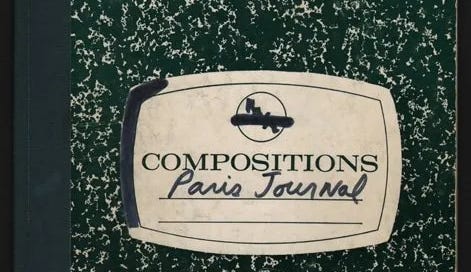


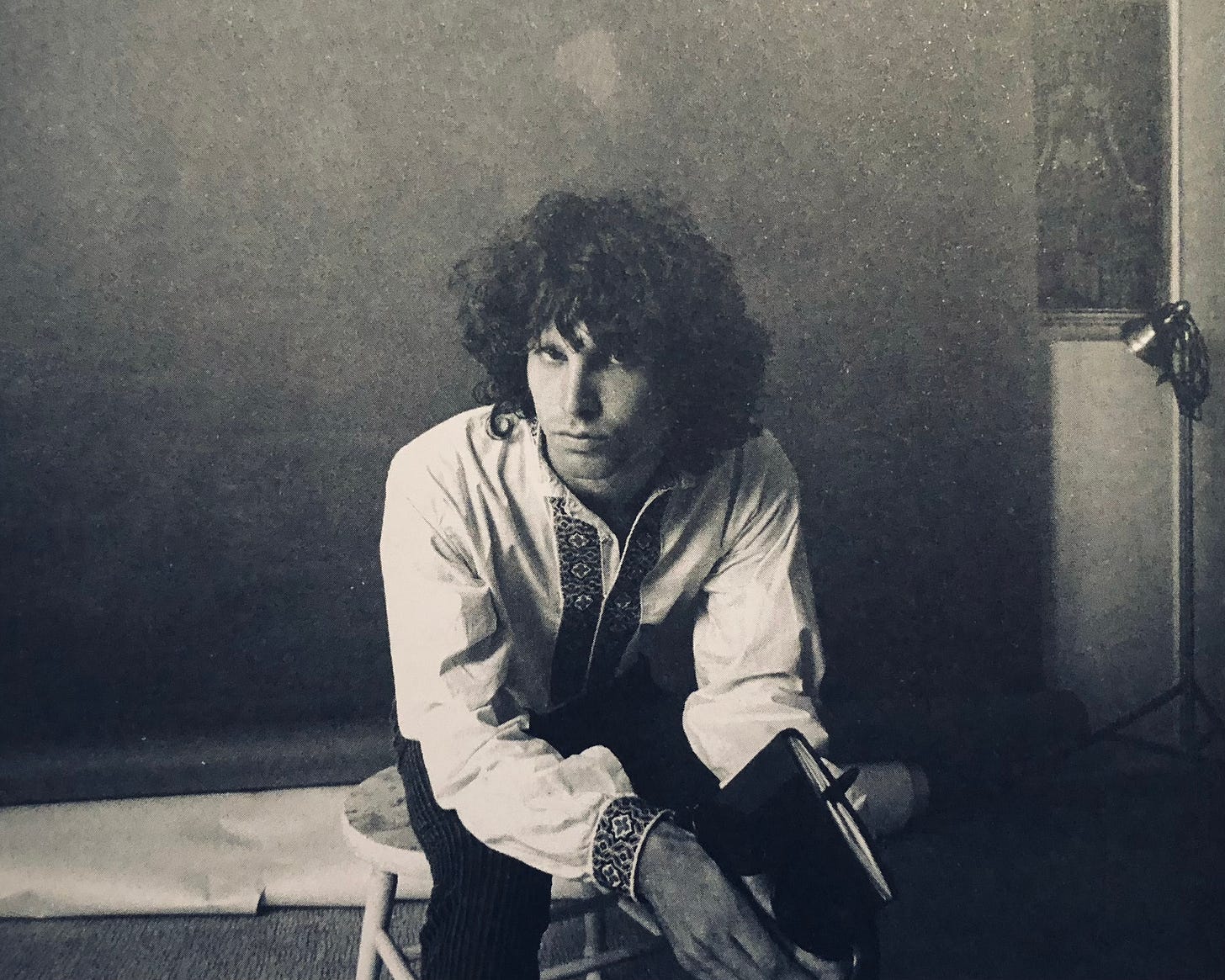
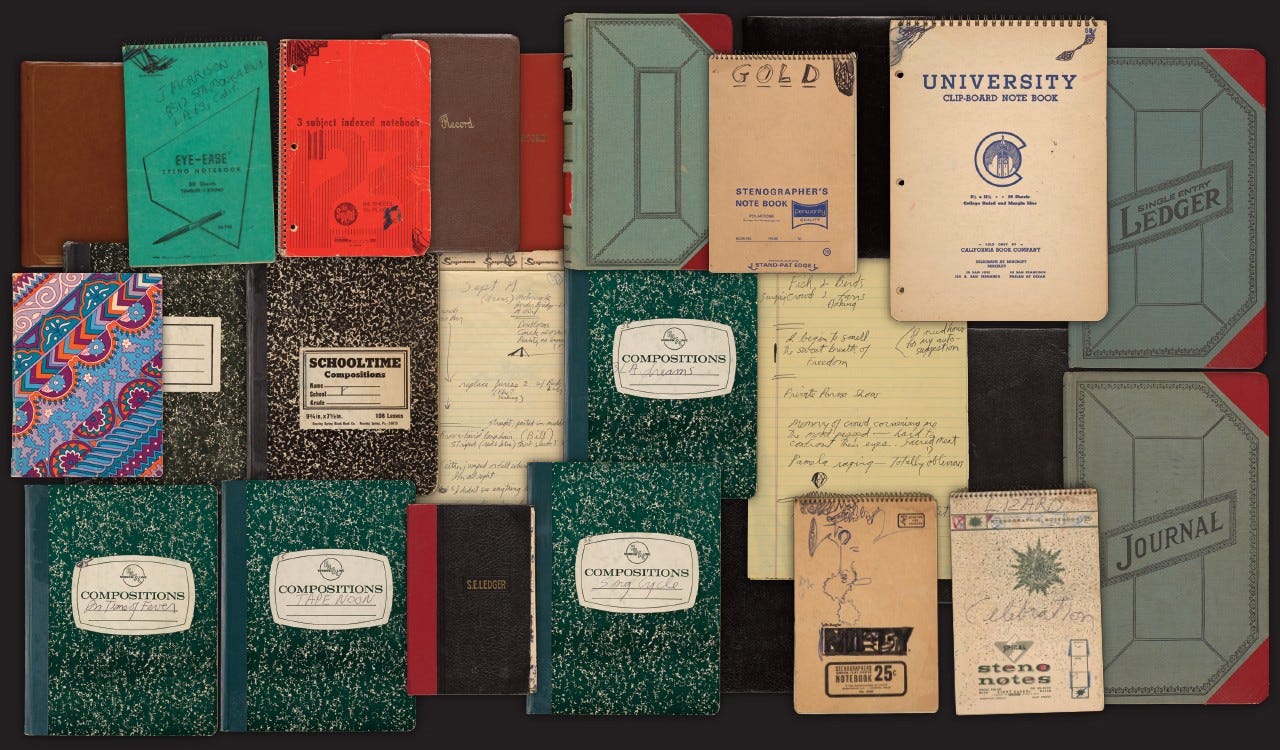

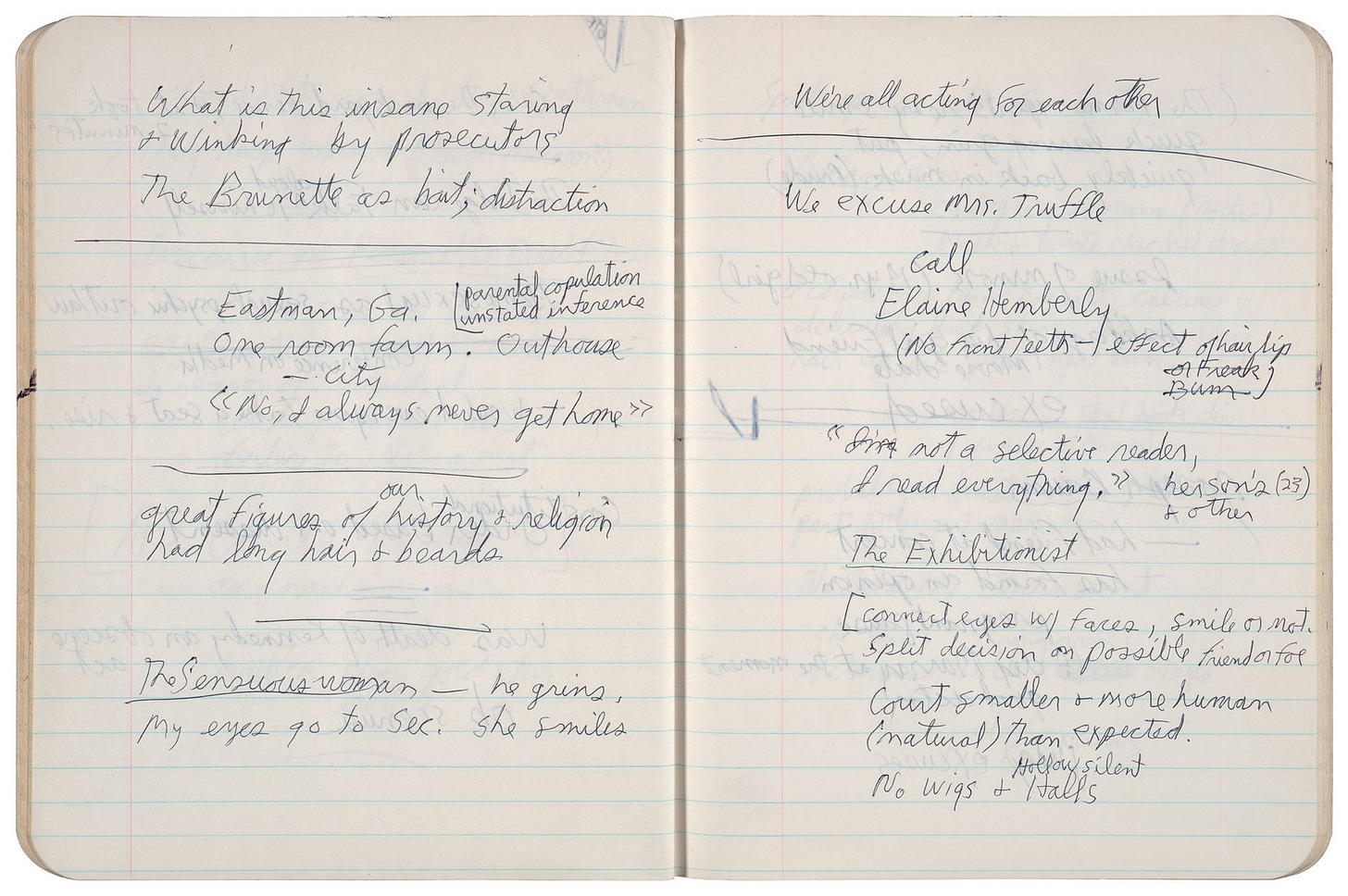

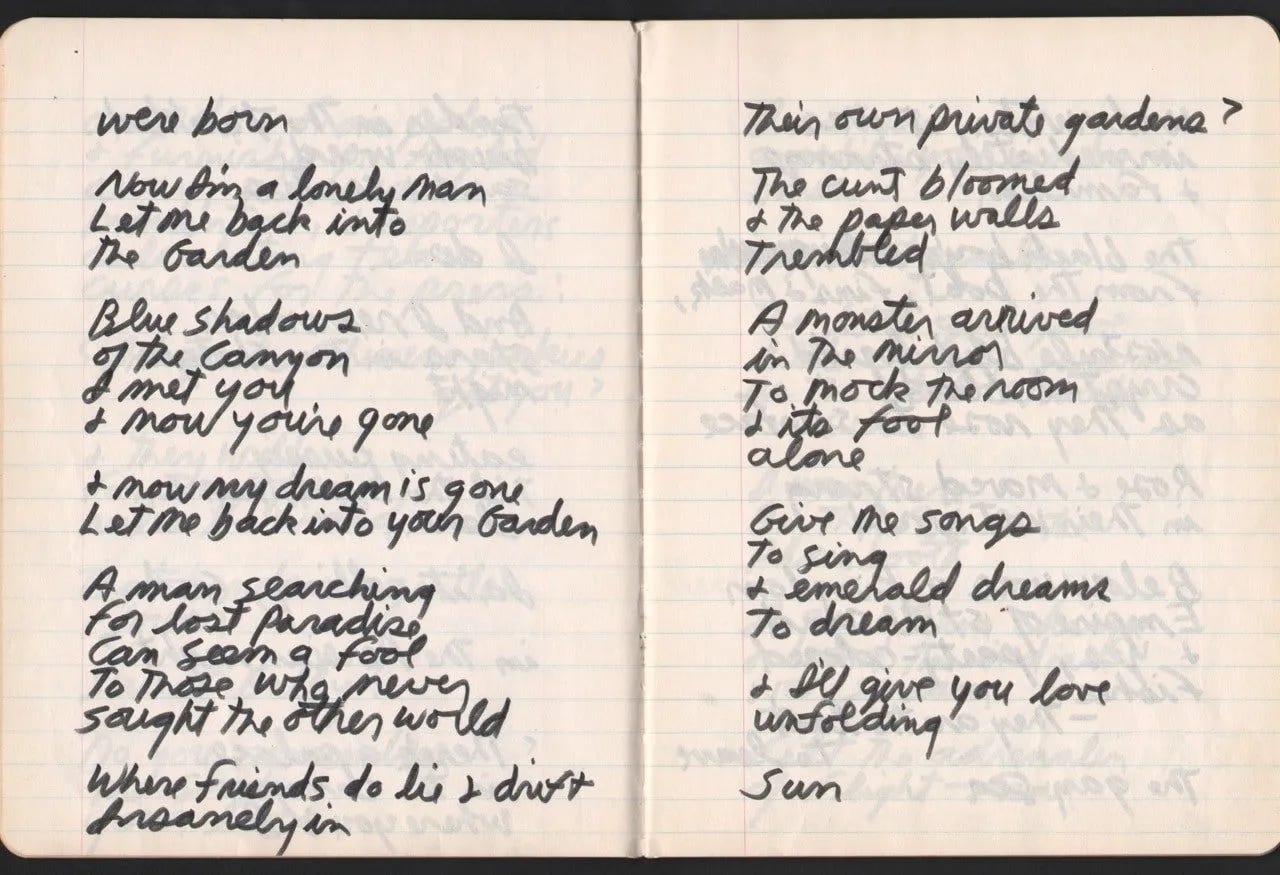

Thank you for sharing. I'm mildly obsessed with Jim Morrison and the visionary creatives of his ilk. Having spent much of my life with musicians, I've seen the same type of struggles; to understand their own hearts and minds, to rage against the boundaries, all underpinned by an absolute need to create which is as undeniable as breathing. It fascinates me endlessly.
Believe it or not, I just learned who Jim Morrison was this year. I knew of The Doors, but had never actively listened to their music.
One day at work (I’m a library assistant), someone returned The Collected Works of Jim Morrison and upon flipping through this coffee table book with a stunning portrait on the cover, I decided I needed to check it out for myself.
The book contains text and photo copies of his poetry, journals, transcripts, lyrics, and a film treatment for The Hitchhiker. I thought, “what a record of a person’s existence.” I love that this is how I was introduced to him and that I’ve had a chance to experience him first through the lens of his written works rather than his music.
Thanks for sharing and reminding me of this!